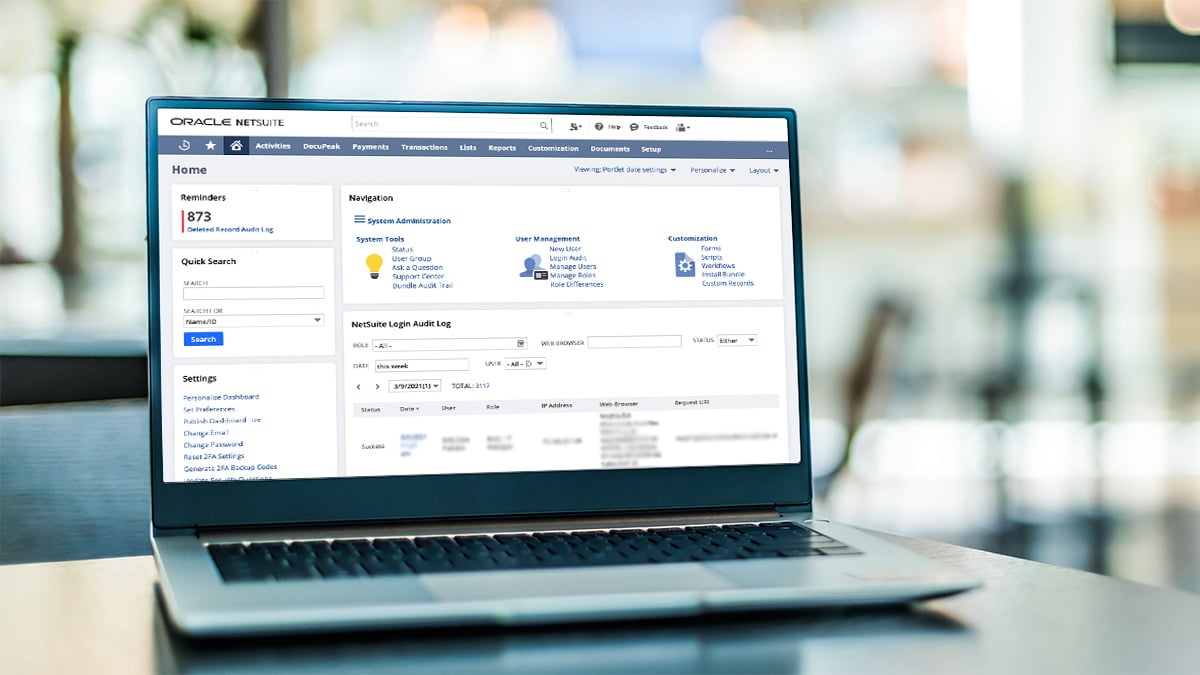It could be said that Oracle NetSuite set the original standard for a multi-tenant cloud ERP when it was founded in 1998. It was one of the first Enterprise Resource Planning vendors to develop exclusively in the cloud, and it continues as an industry leader to this day.
According to Gartner Group:
NetSuite ERP is a comprehensive ERP suite that includes accounting, purchasing, planning and budgeting, order management, production management, warehouse and fulfillment management, HCM, commerce and supply chain management capabilities. It delivers these capabilities on the NetSuite SuiteCloud Platform, which enables users and third parties to extend, customize and integrate applications. NetSuite supports over 20,000 customers across 212 countries and territories, in over 27 languages.
NetSuite is best suited for midsize enterprises or divisions of large enterprises in need of robust ERP functionality on an extensible cloud-based platform. While it serves a wide range of industries, it performs especially well in high-tech, retail, nonprofit, and wholesale distribution sectors.
NetSuite can assist companies with a multitude of business needs, including:

NetSuite reports that they have more than 38,000 customers across 219 countries using their software. So why do so many organizations choose NetSuite over other applications? Here are a few of the reasons why we think they ultimately select NetSuite as their ERP.
NetSuite offers a collection of modules and applications that allow organizations to choose the features they need and omit the features they don’t need. While some ERPs are designed with a specific industry in mind, NetSuite’s versatility makes it well-suited for a variety of industries and organizations.
NetSuite features include:
Another reason many companies choose NetSuite is their robust network of implementation partners devoted to empowering clients for success. With experience across a variety of industries, customers can certainly find an implementation partner who not only knows NetSuite but also their field and can help solve industry-related implementation obstacles.
NetSuite implementation partners offer implementation assistance, technical development, and software customization to fit your needs. Some consultants also specialize in large-scale NetSuite implementations. Such firms can take you through the entire implementation process, including software configuration, implementation management, change management, and project management.
NetSuite allows for customization and configuration of nearly every aspect of their software platform. Depending on which NetSuite modules you implement, you can add customizations such as:
NetSuite is committed to expansion through research and development of its product offerings. Oracle has said that 20 years from now (and beyond), they want NetSuite to remain as relevant as it is now. We have observed their continual efforts to improve their products and user experience. They also add modules and expand the applications to work in an ever-widening sphere of departments, from sales and marketing to HR and accounting.
As Oracle continues to funnel development funding into NetSuite, it generates customer confidence in the company and its products. In the past couple of years alone, NetSuite has made dozens of major enhancements to its applications and software. They continue to augment an impressive array of solutions by adding features to existing solutions.
The last item on our list of reasons why organizations ultimately choose NetSuite may very well be the most important. NetSuite offers the feature functionality we have outlined in this article at a cost that works for mid-sized businesses as well as large corporations.
Companies that don’t have massive budgets can get software that is configurable and customizable. NetSuite is priced so that it is not too expensive for most companies that are big enough to need it.
If you are considering purchasing NetSuite, but are unsure if it offers what your organization needs, we can help. ERP Advisors Group has a long track record of experience in NetSuite consulting, and we can help with everything from the selection of applications through the entirety of the implementation project.

The NetSuite ecosystem is full of firms that can assist you with implementing your NetSuite instance and avoid a "NetSuite Nightmare". There are various types of partners in the ecosystem, including those who have developed extensions to core NetSuite functionality. To effectively evaluate if NetSuite is right for your business, you must understand the types of NetSuite partners in the market.
To help you determine which of these companies may be right for your organization’s needs, let’s examine the different types of NetSuite partners and what they do. Be aware that while there can be some overlap between these types — they are not always entirely distinct from one another.
When you have a large, complex deal where you want more influence over the software vendor on the implementation, it may be best to buy your software and implementation services directly from NetSuite. NetSuite has internal teams who can lead your project and ensure you have greater access to executive resources in case of stumbling blocks over the course of the implementation.
Sometimes NetSuite will bring in an Alliance Partner to provide the professional services for the software configuration. The Alliance Partner does not sell the software itself; therefore, it must be purchased directly from NetSuite. Alliance Partners tend to be experts in a specific industry, which can be useful in certain, complex implementations.
These are companies that are authorized to sell NetSuite licenses and have proven their expertise in everything from accounting and ERP to CRM and e-commerce solutions. They offer complete NetSuite services, which include the implementation of the software and technical support once it is installed. This might be the right path for businesses with the need for customizations or deeper developer support.
Some large accounting firms also offer NetSuite sales and implementation services. They can walk you through the entire process of business improvement while also helping you with the integration and implementation of the product. Both Alliance Partners and Solutions Providers can also be large accounting firms.
Finally, there are also Independent Software Vendors (ISVs) in the SuiteCloud Developer Network, also known as SDN partners. ISVs make tools and products that sit on top of the NetSuite technology stack. You might use this type of partner if you need specific functionality built into NetSuite to comply with a requirement or regulation or to provide more advanced functionality in a specific module.
Deciding which type of NetSuite partner is best for you is something that is done on a case-by-case basis. While we provide key questions to ask yourself about your organization and your project, there are no cut-and-paste answers. Enlisting an independent advisor like ERP Advisors Group can help you make the right decision, always.
You may want to work with NetSuite directly if you need specialized resources across multiple aspects of your project.
You’ll find that NetSuite has many resources available that specialize in many fields. They have technical experts in a number of industries, such as distribution, construction, and manufacturing as well as international resources who speak the local languages and understand NetSuite better than anyone else.
If you want to work with a smaller firm or one that has a specialty in your particular industry, then you may want to choose an Alliance Partner or a Solutions Provider. These types of companies are usually entrepreneurs who are more client-focused and invested in ensuring you are satisfied with their services.
If you prefer to speak to one person throughout your selection and implementation, you may want to choose a smaller NetSuite Solutions Provider who can sell the software and offer the implementation services, as well. This can be helpful if you want the people who sold you the software to be there for your implementation. They will have an intimate understanding of your project from beginning to end.
If your project needs additional software integrations or specialized tools on top of the standard functionality from NetSuite, you may want to choose to work with an Independent Software Vendor. They often assist with more complicated integrations where a requirement needs to be built into the software for a particular organization.
No matter what type of NetSuite software you want, or what kind of implementation or integration your project will require, ERP Advisors Group can offer the assistance you need.

Clients are often surprised to learn how much the implementation partner doesn’t do. For example, many businesses find themselves saddled with a massive data migration project that will go unmanaged by the implementation partner.
At ERP Advisors Group, we act as a trusted advisor between clients, vendors, and implementation partners, to ensure software projects are completed as smoothly as possible, without the risk of common industry failures. Our Client-Side Implementation Consultants handle tasks the implementation partner doesn’t do that often requiring considerable time, effort, or technical know-how.
We have done a lot of business with NetSuite and other cloud-based solutions, and we can help you validate whether NetSuite is the right vendor for your company.
Once we have validated NetSuite is the right application for your needs, we will help you determine the right implementation resources from one of the options listed previously: NetSuite Professional Services, Alliance Partner, or Solution Provider.
Here at ERP Advisors Group, we have experienced client-side implementation consultants who have led many NetSuite implementations to successful go-lives. We also have experience with solving functional and technical problems, such as issues with banking or EDI integrations.
Aside from expert project guidance, we also have a dedicated team of data migration specialists and consultants who address data migration challenges to ensure ERP implementation success. These experts take responsibility for extracting, cleansing, validating, and loading your data alongside your SMEs.
We offer client-side implementation services for NetSuite projects through the following roles:
This is a person from our firm who sets up the meeting cadence, project plans, budget trackers, and calendars. They monitor every possible aspect of the project, which is vital to ensuring everything moves forward and nothing is missed that could derail the implementation.
The Functional Analyst knows a lot about NetSuite and how it should function. They learn your business intimately to ensure your requirements are met. Additionally, they develop business process models to show progress throughout the system, even assisting with application testing, training, and documentation.
This is someone who will help with NetSuite data migration tasks. Tasks include extracting data from legacy systems, performing data hygiene, and correctly formatting data for NetSuite. Technical analysts also load the data and test the loads.
Technical analysts also manage integrations with banks and payroll providers, along with other third-party business applications, such as an expense tracking system. These analysts can assist with necessary vendor and e-commerce system integrations.
Because of the variety of technologies available on the market and so many possible configurations, a NetSuite platform specialist who knows the integration toolset and the right integration tools is vital to the success of your project.
During NetSuite implementations, change management may be neglected due to focusing on the technical configuration of the application, and forgetting about key users. A change management specialist can uncover if key users have effectively communicated what they need from the new system and whether those needs are being built into the application. From there, they can confirm if users have validated the requested application programming and that it is understood. They will also ensure that everyone is properly trained on the new system. Finally, at go-live, they will make certain all users are ready to use the new program.
When it’s time to choose a NetSuite product, be sure you get the right NetSuite consulting firm. ERP Advisors Group has the experience to help you successfully go live.
Colorado
390 Union Boulevard, Suite 540
Lakewood, CO 80228
866-499-8550
303-350-3087
info@erpadvisorsgroup.com
Florida
600 Cleveland Street, Suite 379
Clearwater FL 33755
866-499-8550
info@erpadvisorsgroup.com
Terms & Conditions | Privacy
© 2025 ERP Advisors Group